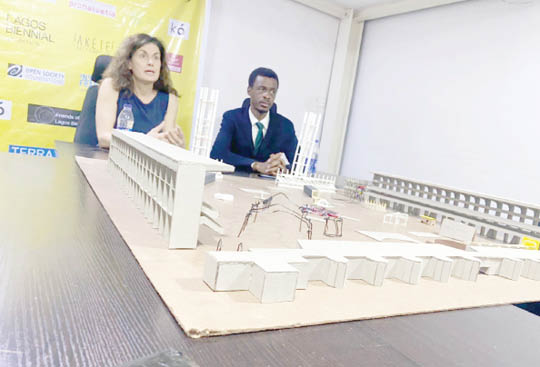Lagos Biennial Arts show to scratch Nigeria’s layers of history’
The Lagos Biennial, a well-known arts and culture event, has commenced its fourth edition in Lagos, unveiling a visual tapestry under the theme REFUGE. Taking place at the historic Tafawa Balewa Square from February 3 to 10, the international exhibition was designed as a “thought-provoking exploration of contemporary art, design, and architecture.” According to the […]

lagos biennial arts show team
The Lagos Biennial, a well-known arts and culture event, has commenced its fourth edition in Lagos, unveiling a visual tapestry under the theme REFUGE.
Taking place at the historic Tafawa Balewa Square from February 3 to 10, the international exhibition was designed as a “thought-provoking exploration of contemporary art, design, and architecture.”
According to the organisers, the theme, REFUGE, delves into the complex concept of the nation-state and invites critical reflection on the venue itself, Tafawa Balewa Square, a site steeped in historical significance as the location of Nigeria’s independence celebrations in 1960.
Founder and co-artistic director, Folakunle Oshun, highlights the venue’s multifaceted role, from nation-making to hosting pivotal events like FESTAC ‘77.
- Rumbling in Kano APC, NNPP over Ganduje’s olive branch to Kwankwaso, Gov Yusuf
- Bandits abduct 55 wedding guests in Katsina
“It is a way for us to scratch the layers of our history, to piece the puzzle of our history—where are we coming from, where are we today?”
“You can also look at the economic and political condition of Nigeria; what is the use of this square compared to what it was before?” he said.
The exhibition features 80 participants from 30 countries while showcasing a diverse range of expressions through architectural pavilions, art installations, artist talks, film screenings, projections, and performances.
Co-artistic director Kathryn Weir stated that the Lagos biennial is well positioned “to reassess the nation-state model and its impact under the influence of global capital.”
“The critical issues of this 21st century are played out in local, national, and regional spaces,” she stated.
